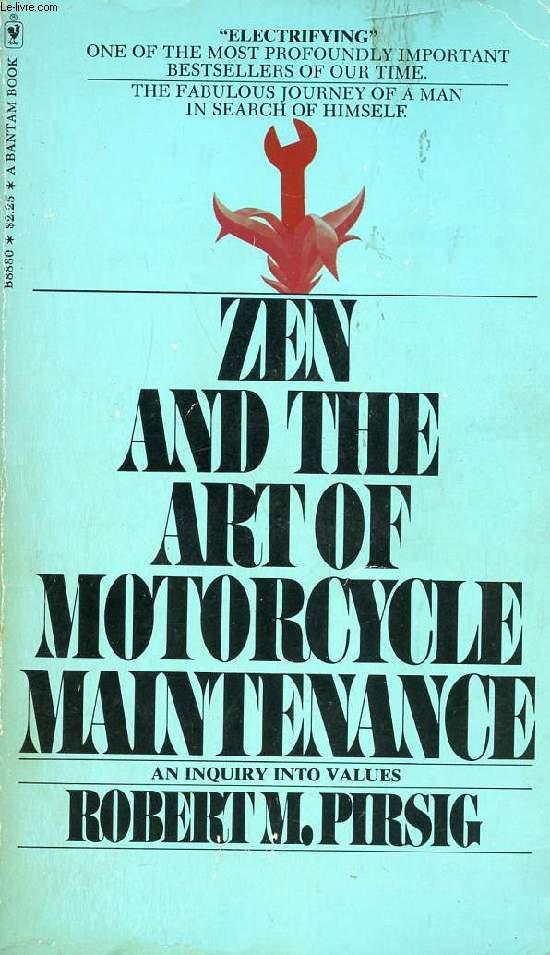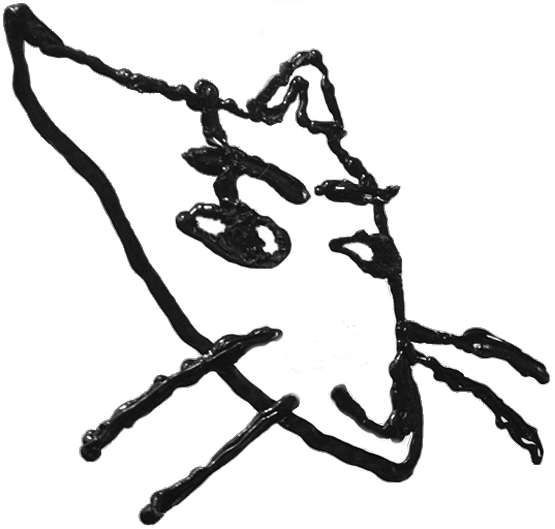I like Amazon reviews that follow up years later with updates — like, “I bought this vacuum cleaner 40 years ago and as I previously wrote, I thought it was great, but now I’m here to report it broke and so it’s really a cheap piece of shit.” I was sixteen in 1984 when I first read Zen and the Art of Motorcycle Maintenance (ZAM), and I told everyone at the time it was the best book ever written. This is my follow-up review.
I read ZAM about a dozen years after it was published, but it was still basically a bestseller. I think I found it in a used bookstore and read it because I liked the cover. It’s not an exaggeration to say it completely changed my life. I can say this with a straight face since I was just sixteen years old and couldn’t really know better. I can also say it with a straight face because it was likened to Moby Dick by George Steiner in the New Yorker in 1972, perhaps in a senior moment. Oddly it received glowing reviews pretty much everywhere. Even the NYRB, whose sole job is to savage a book like ZAM, is ambivalent. They acknowledge that it was an “important” book despite some shortcomings. But I’m not getting off to a fair start here. The book made me who I am and I’m not all bad.
When I first read ZAM, I absorbed it like a baby cactus — I just sucked up every bit of moisture from it — the voice, the road trip, the values, the pretensions. The book has a serious ambition to answer fundamental ontological questions and at sixteen I was jumpstarted and ready to prick other people’s ideologies. When I finished, I told my parents I was buying a motorcycle.
They proceeded to laugh off this idea, as I didn’t seem like the kind of person who could get it together to buy something as big and expensive as that. Normally it requires a job to buy a motorcycle. What my parents didn’t realize was that I could sell all of my belongings (and some of theirs) for just about as much money as a used bike cost. I also borrowed $200 from my friend Bill. When I came home with the bike, an ’82 Honda CM450c, it was a little late to intervene. I didn’t realize it at the time, but it’s almost the same as the bike Pirsig drove when he supposedly took the trip that is cataloged in the book. That bike is in the Smithsonian now. To be fair, nothing in the book suggests you should sell whatever is at hand to get a motorcycle.
So, in 1986 I rode my motorcycle to college with ZAM in my backpack and its arguments in my head. I was put on academic leave after my first semester because I thought and acted like the roots of western philosophy and my professors were bullshit and no one, it seemed, appreciated my take. The professor who asked me to leave was a Hegelian. Out of school, I was forced to work blue-collar, minimum wage jobs for a year, which clarified a few things, namely that I should go back to philosophy with a more open mind. I said as much to the Hegelian and he gave me a second chance. This was unusual because Hegelians are not generally known to give second chances, but I guess he felt I was sufficiently aufhebunged.
By this time I’d been riding a motorcycle for a couple of years, and since I never had any money, I learned a lot of motorcycle maintenance. I bought the 480-page shop manual on the CM450c. It was probably the technical motorcycle parts of ZAM that first clued me in to the book being a little misleading. If he was wrong about something as easy as motorcycle maintenance, perhaps the metaphysics had problems?
ZAM has three main pillars: Philosophy, Motorcycles and Fatherhood. At fifty-four years old, I have now legitimately been tackled by all three of these. First, as I’ve indicated, came the motorcycle which was my only form of transport for 15 years. I still own one today and was riding my youngest son to kindergarten on it not too long ago. Philosophy became a bigger love of mine — I’ve studied it my whole life, first as an undergrad and then in several grad schools. Like the author of ZAM, I’m ABD and always thought I’d teach. But also like the author, I felt that I needed to really understand it all before I could responsibly do so.
Since Hegel has been my white whale, that’s been somewhat untenable. Pirsig has his own white whale in the book, which he calls the “metaphysics of quality” (MOQ), and hides its utter incoherence inside the story of the main character going insane from such deeply original thoughts. This is of course nonsense, there are no original thoughts in MOQ, but when pressed about Hegel, I might want to hedge like this too. Like the author, my main line of study has been both deep and debilitating. But I’ve at least read western philosophy before mouthing off about it. It’s quite clear Pirsig hasn’t. Calling MOQ a white whale is not to legitimate Steiner likening it to Moby Dick, which is simply mind-boggling.
The last parallel between Pirsig and myself, and my supreme qualification to review this book, is that I too have some sons now. Pirsig has more than the one son that he focuses on in the book. He evidently had another son and a daughter and also a wife but you never hear about them. His wife and other kids are so MIA in his book, one feels sorry for them and then Googles them to learn that they were super fucked up and upset after publication. Pirsig also remarried and moved overseas to live on a boat. It makes one wonder a little about the author. I have a wife and three boys. If I focused on my favorite of them, I’d still be at least mentioning the shortcomings of the others. Pirsig doesn’t tell us anything about them. The book is subtitled “an inquiry into values” and there’s definitely some fucked up family values in the book. But still, I’m not being entirely fair. ZAM was without a doubt the most important book of my life.
After doing my BA, and actually reading Kant and Aristotle, I realized that the first pillar of the book was a little rickety, so I stopped carrying it with me everywhere. It was a relief to not always have that book with me. It weighs at least a pound and my copy was so ratty that it required kid gloves and a protective wrapping of imported Japanese rice paper. I used to take it backcountry camping, an enterprise where one is so laden down with supplies that one needs to choose between things like spare socks and food. There was never a time where ZAM came in handy on one of those trips. But to be fair, Hegel isn’t useful there either and his books weigh more.
ZAM seems relevant enough to pack on one of those trips though. It’s full of detailed exegeses of the motorcycle maintenance any sensible person needs to perform on a road trip. The whole story is framed around just such a trip with his troubled twelve-year-old son. But just a year into owning a bike I learned these exegeses were nonsense. In one scene, Pirsig wakes up 45 minutes early one morning to adjust the tappets on his bike. I remember the magic of that word when I first read it. Other readers I’ve interviewed for this review mentioned that word to me too. What on earth are tappets? It turns out this is insane.
Adjusting the tappets is a job that takes hours and specialized tools. You need to remove the gas tank, the rear brake line and the engine head to do it. I did it once, because my CM450c had tappets and because Pirsig made me feel like tappets might be the inner essence of technology and soul work. So for no real reason I adjusted them. Nobody in the history of motorcycles has done this while on a camping trip. Also, tappets are proleptic shitty engineering and this is why no modern bike has them anymore. Pirsig also changed his tires and chain after what I calculated must have been under 600 miles of driving. The amount of maintenance he performs would have required that he be tailed by a tool and parts truck. But I didn’t fully realize all this at the time. It was only on re-reading it as a fully fledged adult-philosopher-biker-dad. But I’m getting ahead of myself.
I’d be lying if I said moving on from that book was easy. It was easy for me to leave the Jewish faith — Israeli nationalist Hebrew School made that easy — but I imagine it felt like what someone who loved the Church as a child felt when they realized God was dead. Or like leaving the girlfriend at the time who I loved but just knew was all wrong. To be honest, she left me. I told friends at the time who knew of my obsession with the book about the break up. ‘It was that tappet bit,’ I said… and that the Aristotle and Kant which formed two thirds of the book was wrong, and so I needed to just move on. But I looked back for a long time and the book looked back at me.
Twenty-five years went by in my life without thinking too much of it. Somewhere along the way I even lost the relic. But a few months ago, I rented an Airbnb with a friend who I had known even earlier than ’84, and who probably tolerated my obsession with this book back then. He told me subsequently that he had loved ZAM and read it around the same time as me. But he hadn’t become a philosopher-biker-dad. Why? Why had he become a lawyer? Pirsig doesn’t even like lawyers. I should mention that most of my family was with me in that Airbnb even though they have nothing to do with any of this.
On the shelf of that Airbnb was the same edition that I had originally read. It was a mint green paperback and on the cover there was that image of a wrench emerging from a lotus — a clever symbol of one of the ideas of the book — that science could be spiritual and that we do ourselves a favor by learning how to get to the meat of things. I agree with this perspective. It’s who I am and anyone who knows me knows I don’t pay people to do most things like building stuff, engine repair, or plumbing, to name only three random things. This quality has enriched me but has also taken a pretty big toll: think the destructive power of a table saw and the fragility of the human hand.
There’s a song on Blood on the Tracks, I think it’s Tangled Up in Blue, maybe not, where he croons about Verlaine’s words burning off every page as if it was written in his soul. Somewhat sheepishly I report this experience, though it wasn’t Verlaine that did it to me. I hadn’t picked up ZAM in 30 years, but I felt my mouth forming every word I read. I had this book literally memorized and so I continued, trance-like, to recite this book to itself. My bad memory is legendary in my family. Only my oldest son has a worse memory. I forget if he’s the oldest. But I really did remember every word of ZAM.
And as I read, I relived my life, as it was and as it continued to be in the present. As is my penchant, I mostly saw the mistakes, the three pillars kicked out after only 50 pages in. But there was still some fine writing and a touching but troubling relationship with his son and the core values of the book were still mine, well maybe not the fathering and husbanding or the epistemology, but the do-it-yourself values, the descriptions of red wing blackbirds and a certain amount of bullshit. I feel like I’m still not being totally fair.
Here’s the thing to say about this book, if it isn’t already clear. It completely changed my life’s trajectory without my sending even a dollar to someone like Tony Robbins. This book made me sell everything I had to buy a motorcycle, which then led me down the backcountry trails of Montana where I saw bears who were disappointed I had this stupid book instead of food. It found me love because I had a motorcycle and a fluency with Kant. It led me to Hegel who then wasted decades of my life. Lastly, despite Pirsig’s bad relationship with his son, it didn’t scare me off from having kids though it did give me the wisdom to prevent them from reading this book.
As I was recently waxing nostalgic for ZAM, the story of realizations and lessons learned, etc., my middle son (I think he’s my middle son) bemoaned that I had told him not to read it. Why, he asked, would I have denied him this book that had so transformed my life, the father that he loved so much. He was 16 at the time I scared him off — the same age as me when I had first picked up this book. He could have had a similar experience to mine. Well, I said, get your own fucking book. You like Wittgenstein, so go build a cabin in the middle of Finland or something, like he did. This is my story and it’s a three-legged stool with no remaining attached legs — so why would you want it for yourself anyway? It’s no Moby Dick no matter what stupid George Steiner said. And then my youngest son chimed in and said he was gonna get a motorcycle when he’s older and I said, no fucking way. I might preemptively sell all his shit.
And so, dear reader of this Amazon review — 40 years on, I say, “This vacuum cleaner changed my life, made me what I am, but it’s really a piece of shit, has tappets and you should buy some other book. This one is mine.”




